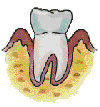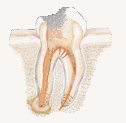
Toothache During Pregnancy
A toothache during pregnancy can't always be avoided, and certainly it is not something that can be ignored. Developing a pregnancy toothache is considered to be affected by two main factors. The first one is a fact, but the other is only a myth. The fact is that women have a higher chance of developing dental problems, experiencing tootha pain or loosing a tooth while pregnant. The myth is the widely spread misconception that you should not have dental treatment during pregnancy because it could harm the fetus.
Causes of Tooth Pain in Pregnancy
As any other woman, pregnant women are susceptible to dental problems such as tooth decay, gum disease, wisdom teeth eruption, tooth fractures or other problems. Additionally, certain factors have been suggested to increase the chance of developing certain dental problems that may cause severe toothache during pregnancy. The most important causes of pregnancy toothache include:
- Pregnancy gingivitis – Pregnancy related changes to hormonal levels in the woman’s body can cause inflammation and swelling of the gums. The condition is known as pregnancy gingivitis and if not treated, it can develop to periodontal disease, severe gum infection and gum abscesses that can become very painful. Over 50% of all pregnant women experience at some degree the symptoms of pregnancy gingivitis.
- Diet changes – Hormonal and psychological factors may cause changes in the dietary patterns during pregnancy. Many pregnant women increase the consumption of sugar, which leads to a high risk of developing toothaches due to tooth decay.
- Calcium deficiency – Pregnant women need increased intake of calcium, which is used for the bone formation of the baby. Lower calcium levels of the mother may weaken the natural remineralization cycle of the tooth enamel and increase the risk of cavities and tooth pain.
- Morning sickness - Vomiting incidents, especially during the first trimester of pregnancy, can cause irritation of the gums and demineralization of the tooth enamel due to stomach acids, promoting gum disease and tooth decay.
- Poor oral hygiene - Pregnant women sometimes become sensitive to the smell or taste of toothpaste and they start to avoid tooth brushing. Neglecting their oral hygiene puts them at high risk of dental problems and pregnancy toothache.
Risks of Ignoring a Toothache While Pregnant
Believing the old word of mouth that having dental treatment during pregnancy can have adverse effects on the health of your baby, is exactly what will put you and your baby at risk. Trying to ignore the toothache by taking over-the-counter tooth pain medications, in an effort to get toothache pain relief to ease the discomfort and avoid treatment believing that this way you protect your baby, can cause serious health complications to both of you.
![]() Ignoring a common pregnancy gingivitis, will allow the condition to develop into severe gum infection and periodontitis.
An active infection is potentially threatening situation for both you and the fetus, and in no case you should postpone treatment until after pregnancy.
Ignoring a common pregnancy gingivitis, will allow the condition to develop into severe gum infection and periodontitis.
An active infection is potentially threatening situation for both you and the fetus, and in no case you should postpone treatment until after pregnancy.
![]() A tooth pain during pregnancy is a sign of an existing dental health issue that requires dental care by a dentist.
An untreated dental condition can cause permanent damage to your teeth and gums, and lead to tooth loss, gum recession and jaw bone loss.
A tooth pain during pregnancy is a sign of an existing dental health issue that requires dental care by a dentist.
An untreated dental condition can cause permanent damage to your teeth and gums, and lead to tooth loss, gum recession and jaw bone loss.
![]() Avoiding treatment when having a pregnancy toothache may also cause complications to the birth of the child.
Several studies have shown that pregnant women with periodontal disease have four to seven times increased risk of premature birth and delivering low weight babies.
Avoiding treatment when having a pregnancy toothache may also cause complications to the birth of the child.
Several studies have shown that pregnant women with periodontal disease have four to seven times increased risk of premature birth and delivering low weight babies.
![]() A continuous toothache pain that is left untreated increases the stress level of the mother.
Toothache pain relief in pregnancy is very important in keeping stress under control.
Many doctors consider higher stress levels as more harmful for the baby than the remote possibility of adverse effects of a dental treatment that could relieve you from the pregnancy toothache.
A continuous toothache pain that is left untreated increases the stress level of the mother.
Toothache pain relief in pregnancy is very important in keeping stress under control.
Many doctors consider higher stress levels as more harmful for the baby than the remote possibility of adverse effects of a dental treatment that could relieve you from the pregnancy toothache.
You can and should have dental treatment for any dental problem causing a toothache during pregnancy.
What to Do With Toothache in Pregnancy - Precautions
First of all, if you experience a toothache during pregnancy do not start worrying or wondering what to do, what medicine to take for the pain, or start following advice from relatives, friends or neighbors. Visit your dentist.
Dentists and doctors suggest that dental health problems should be treated even during pregnancy, but there are some considerations that have to be taken care of. The main concerns are related to x-rays, anesthesia and taking medication for toothache pain relief during pregnancy. You should always inform your dentist that you are pregnant (and on which trimester) so that he can ensure that nothing affects your pregnancy.
- X-rays – Having x-rays before dental treatments is a major concern during pregnancy. Your dentist will try to avoid taking x-rays unless it is necessary. If proceeding with the treatment of the condition causing the toothache requires x-rays, the dentist will use a lead apron shield and thyroid collar that can protect you and the baby from the harmful effects of the x-ray radiation.
- Anesthesia - The dentist will keep the dosage of the anesthesia drugs to the minimum required to ensure your comfort during the procedure and the protection of the fetus.
- Medicines - Some of the available toothache medications can be harmful for the unborn child. Studies have shown that tooth pain medicines like oxycodone and Percocet can produce birth defects. For this reason, it is advised that while pregnant before you take any toothache medication to consult your dentist saying that you are pregnant. Your dentist will recommend specific pain relievers like acetaminophen that are considered safe for pregnant women. Certain antibiotics like penicillin may also be prescribed to fight a tooth infection during pregnancy.
- Necessity of dental treatments – Conditions that cause tooth pain and especially those related with tooth or gum infections should be treated as soon as possible. Some dental treatments that do not affect your dental health such as cosmetic dentistry should be postponed until after pregnancy.
- Timing of treatment – The 2nd trimester is considered to be the safest and most recommended period for receiving dental treatment. If you experience a pregnancy toothache during the 1st trimester when the organs of the fetus develop, talk to your dentist if the treatment can be postponed for some weeks, especially if x-rays are required. However, depending on the severity of the problem your dentist may recommend that you get immediate treatment. The 3rd trimester does not pose any greater risk for the fetus, but it may be uncomfortable for the expecting mother if the treatment requires much time on the dental chair.
- Home remedies for pregnancy toothache – If you have a mild toothache during pregnancy you may try some of the popular toothache home remedies like cold packs, salt water, clove oil or other for some temporary pain relief before you visit your dentist for an exam.
Prevention of Toothaches During Pregnancy
You can minimize the risk of experiencing a pregnancy toothache with regular visits to the dentist, proper diet and good oral hygiene.
- Dental exams – If you are planning to become pregnant, you should visit your dentist for examination and dental cleaning. If possible, any existing dental health issues should be treated before you get pregnant. During pregnancy you should follow the scheduled dental check-ups and dental cleanings.
- Diet – Be careful with your diet. Avoid the consumption of sugar that can promote the growth of bacterial plaque. Take enough calcium to cover the increased needs for the development of the fetus bones.
- Oral hygiene – During pregnancy you should be extra careful with your daily oral hygiene, to prevent common dental problems like pregnancy gingivitis.
If you have problem with the taste of your toothpaste, use another brand or at least brush your teeth with water only. Good oral hygiene can help maintain your dental health and avoid a pregnancy toothache.
If you are suffering from pregnancy toothache, do not hesitate to take an appointment with your dentist notifying him that you are pregnant. Dentists take proper care to ensure the safety for your child during the necessary dental treatments.

 Dental Insurance
Dental Insurance Sensitive Teeth Pain
Sensitive Teeth Pain Cracked Tooth Pain
Cracked Tooth Pain Tooth Abscess Pain
Tooth Abscess Pain Tooth Extraction Pain
Tooth Extraction Pain Toothache Medicines
Toothache Medicines